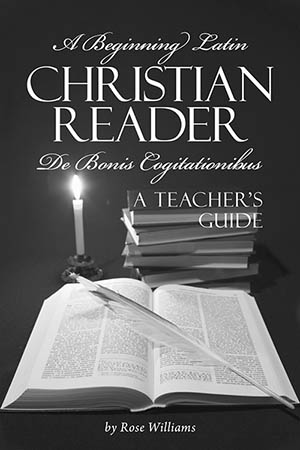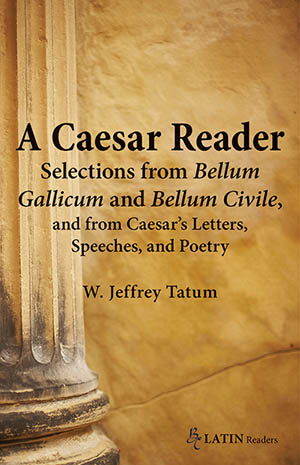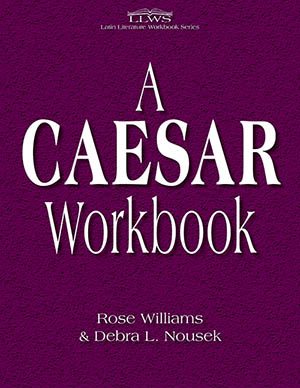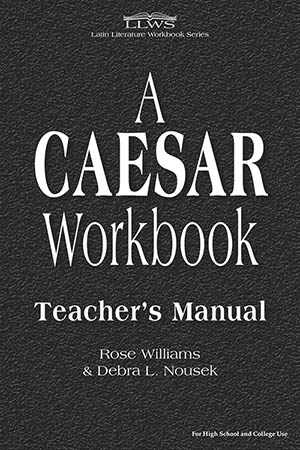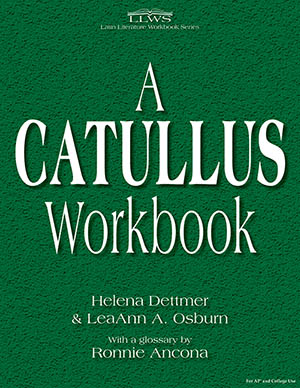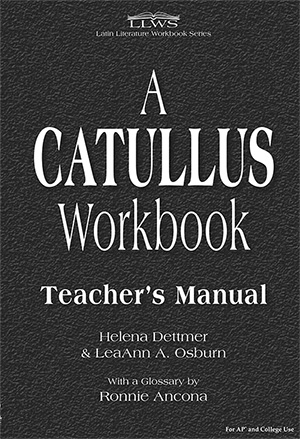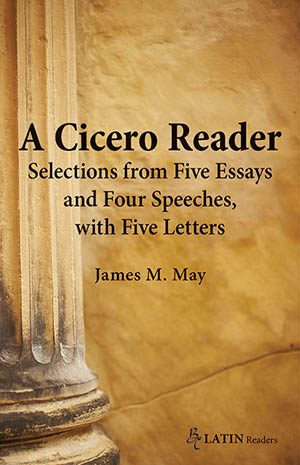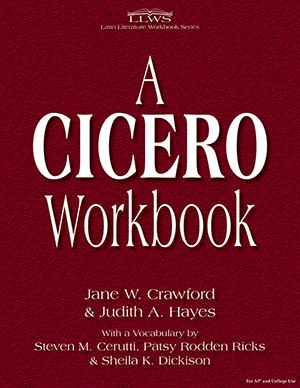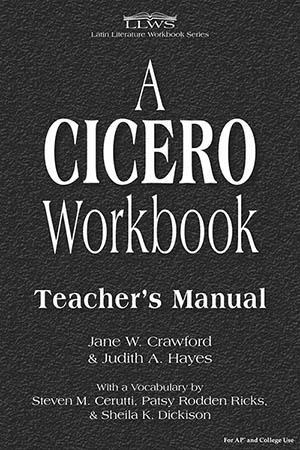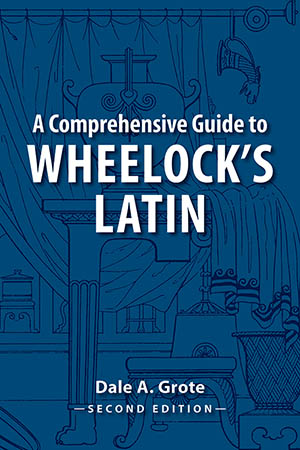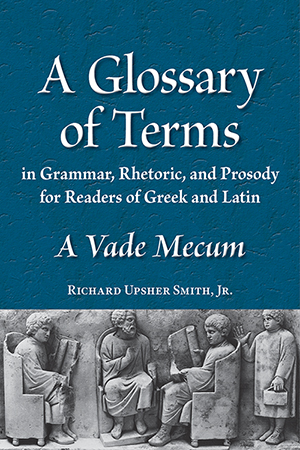A Beginning Latin Christian Reader : De Bonis Cogitationibus A Teacher's Guide
- Author: Rose R. Williams
- 763x
- 978-0-86516-763-6
- Paperback
- Bolchazy-Carducci
- 40
Teacher's Guide for A Beginning Latin Christian Reader.
A Beginning Latin Christian Reader: De Bonis Cogitationibus
- Author: Rose R. Williams
- 7508
- 978-0-86516-750-6
- Paperback
- Bolchazy-Carducci Publishers
- 79
Master Latin teacher Rose Williams has authored a beginning Latin reader that draws from the Bible and other Christian sources as well as from some ancient Roman sources. The choices all illuminate the book's central theme, drawn from Philippians —"Things which are true, things which are honest, things which are just, things which are pure, things which are lovely, things which are of good report; reflect on these things". In the fashion of a graded reader, De Bonis Cogitationibus stories are initially short but gradually grow longer and more involved as the student's skills as a Latin reader grow.
A Caesar Reader: Selections from Bellum Gallicum and Bellum Civile, and from Caesar's Letters, Speeches, and Poetry
- Author: W. Jeffery Tatum
- 696X
- 978-0-86516-696-7
- Paperback
- Bolchazy-Carducci Publishers
- 246
A mature but accessible Latin, a narrative brimming with historical significance and fascination: these were once touted as obvious advantages of reading Caesar's Bellum Gallicum. A change in sensibilities, however, read Rome’s brutal invasion and conquest of northern Europe as problematic, if not disturbing. But questions about the validity of Rome’s actions—and of Caesar's, especially in his later Bellum Civile—are precisely what make these commentaries compelling to read and to discuss. Additional selections from Caesar's letters, speeches, and poetry offer fresh perspectives on his stylistic versatility. Tatum’s commentary guides readers through it all, pointing up Caesar's significance as a representative of his age, culture, and class, while not skirting issues raised by the "intriguingly unsimple mentality" that gave us these works.
A Caesar Workbook
- 7532
- 978-0-86516-753-7
- Paperback
- Bolchazy-Carducci Publishers
- 247
A Caesar Workbook is the latest title in the Latin Literature Workbook Series. It provides all the activities and exercises needed to reinforce the careful reading of classical authors in the original Latin. Sets of exercises geared to the AP* exam engage students directly with the Latin text and lead them to a heightened understanding of Caesar’s De Bello Gallico.
Special Features
- Unadapted Latin passages from Caesar’s De Bello Gallico: Book 1.1–7; Book 4.24–35 and the first sentence of Chapter 36; Book 5.24–48; Book 6.13–20
- Sets of exercises include:
- - preparatory questions on grammar and syntax
- - multiple-choice questions on comprehension, identification, translation, etc.
- - translation
- - short analysis questions
- - essays
- Latin-English glossary
Student Edition Errata, this errata sheet refers to the 2012 printing of A Caesar Workbook student edition, click here to download.
A Caesar Workbook Teacher's Manual
- 7559
- 978-0-86516-755-1
A Caesar Workbook Teacher’s Manual is a valuable resource for veteran and novice teacher alike. This all-in-one teacher’s manual includes the complete student workbook and provides answers directly following each question. The manual also includes a set of analytical essays that pair passages from Vergil’s Aeneid and Caesar’s De bello Gallico as well as paired passages from the De bello Gallico.
A Catullus Workbook
- 6234
- 978-0-86516-623-3
- Paperback
- Bolchazy-Carducci Publishers, Inc.
- 264
Latin Literature Workbook Series: These workbooks are a teacher’s dream—providing all the activities and exercises needed to reinforce the careful reading of classical authors in the original. Sets of exercises engage students with the text and lead them to a heightened understanding of the literary, thematic, poetic, and rhetorical accomplishments of the work.
A Catullus Workbook: Teacher's Manual
- 6242
- 978-0-86516-624-0
- Paperback
- 304
Teachers and students enjoy the sophisticated poems of Catullus. A Catullus Workbook Teacher’s Manual, the complement to A Catullus Workbook, has been designed and written by two master teachers to assist their colleagues as they maximize their students’ appreciation of the elegance and intricacy of Catullus’ poetry.
A Cicero Reader: Selections from Five Essays and Four Speeches, with Five Letters
- Author: James M. May
- 7133
- 978-0-86516-713-1
- Paperback
- Bolchazy-Carducci Publishers, Inc.
- 174
This Latin reader offers 14 selections from the works of Marcus Tullius Cicero, orator, statesman, philosopher, and man of letters, who lived (106-43 BCE) during the final generations of the Roman Republic. Passages have been selected from Cicero's orations, his rhetorical and philosophical writings, and his letters. Each of the passages (which vary in length from 25 to 60 lines) has a detailed commentary, explicating grammatical, syntactical, and historical points of interest.
A Cicero Workbook
- 6439
- 978-0-86516-643-1
- Paperback
- Bolchazy-Carducci Publishers, Inc.
- 248
Latin Literature Workbook Series: These workbooks are a teacher’s dream—providing all the activities and exercises needed to reinforce the careful reading of classical authors in the original. Sets of exercises engage students with the text and lead them to a heightened understanding of the literary, thematic, poetic, and rhetorical accomplishments of the work.
A Cicero Workbook - Teacher's Manual
- 6544
- 978-0-86516-654-7
- Paperback
- 264
The teacher's manual features the entire student text, the answers, and grading guidelines.
A Comprehensive Guide to Wheelock's Latin: 2nd edition
- Author: Dale A. Grote
- 7737
- 978-0-86516-773-5
- Paperback
- 327
This study guide is designed to accompany the seventh edition of the Wheelock's Latin textbook, but can also be used as a review of beginning Latin.
A Glossary of Terms in Grammar, Rhetoric, and Prosody for Readers of Greek and Latin: A Vade Mecum
- Author: Richard Upsher Smith, Jr.
- 7591
- 978-0-86516-759-9
- 140
This book is a glossary of terms in grammar, rhetoric, and prosody that students of Greek and Latin commonly encounter in their first three years of study. While English grammar is the focus the links with Greek and Latin grammar are explained and some Greek and Latin constructions that do not occur in English are defined.

